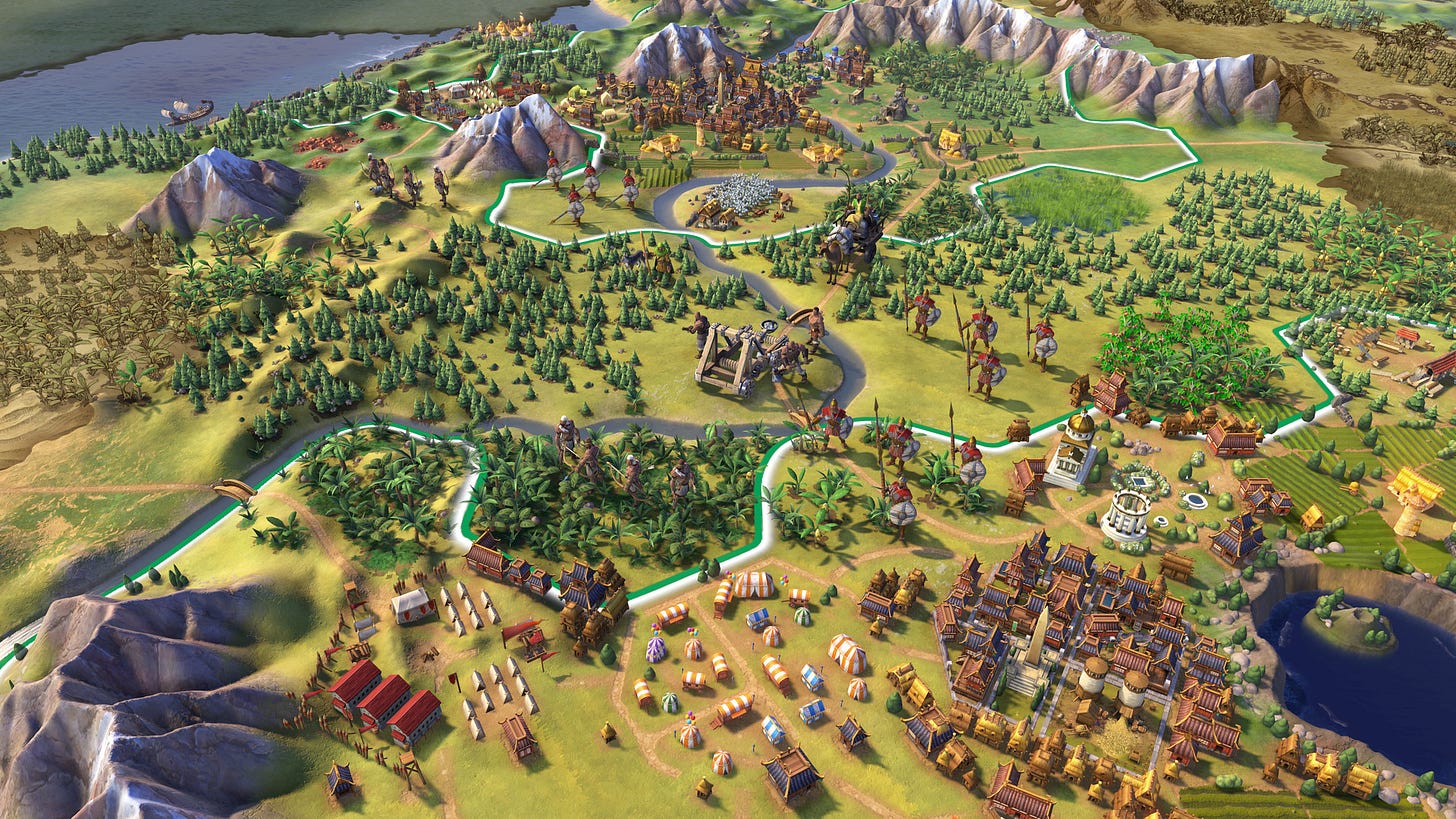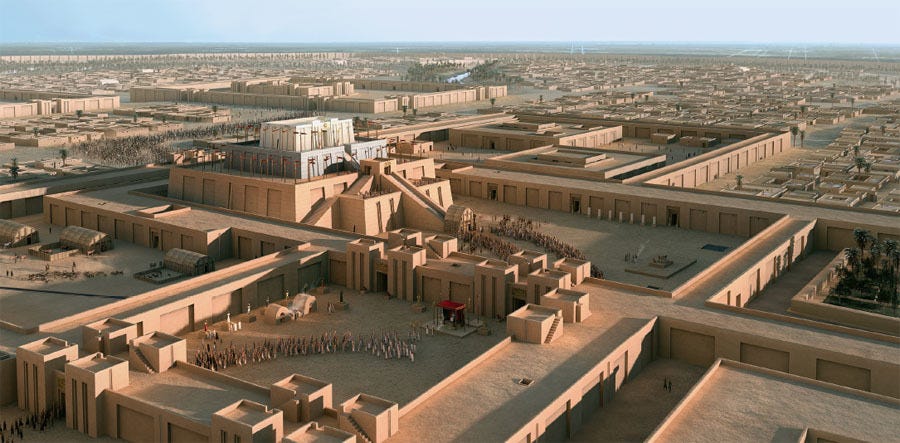What is "Civilization?"
And why does it matter?
I’ve been playing computer and video games of various kinds since 1993, when my parents bought me Myst for Christmas. Even with the copious aid of a strategy guide, it was a bit much for an eight-year-old, and I’d be lying if I said I made it very far before the lack of action eventually drove me out. A few years later, though, I got Civilization II.
It was completely captivating. I had always loved history, from my very earliest childhood, and here was a way to play through history from the very beginning all the way to the future. In the intervening twenty-something years, I’ve spent thousands of hours playing the various games in the Civilization series (II and IV are my favorites). The concept is simple and brilliant: you build your civilization from the ground up, expanding from a single city to many, while researching technologies, building wonders of the world, and conquering your enemies.

Yet despite those thousands of hours spent playing the series, I never really thought too much about the title. Civilization, sure, it was perfect: What other term could we use to encompass all the really important bits of the human past, from writing and cities up to the present day? Those were the things that really mattered, and we could call them “civilization.”
So how is “civilization” defined? It varies, but at its core, civilization refers to a complex of things that appear together: cities, social hierarchies and the division of labor, the written word, and a higher-level form of political organization we can call the state. The precise manifestations of all those things might vary greatly, but that’s the civilization package. If we use this narrowest definition, then civilization appeared in pristine, independent form only four times: in Mesopotamia, Egypt, China, and Mesoamerica. If we consider the inventions of civilization in Mesopotamia and Egypt to be linked, then the number falls to three. Every other fully-fledged civilization was in some way downstream of these others in one or more of those key categories.

After those three or four, we move to possible inventions of civilization, in the Indus Valley, in the Andes, and possibly Neolithic Old Europe, but each of these other possibilities lacks one or more of the key components.
So far, so good. Even if it was only invented in a few places, civilization eventually spread, and that package of things now surrounds pretty much all of the seven billion people living on the planet. Writing is everywhere, so is the state, everybody has cities, and so are social hierarchies and specialized labor. Those are the direct foundations of the world we know and live in today. That’s why they matter, and why tracing their first appearance together is important. In this sense, there’s a good, solid reason why the Civilization games start where they do: They have the same starting point practically every big-picture view of the human past does, with the combination of these key developments.
But “civilization” has only been around for the past 5,000 or so years. That’s a tiny fraction of our past as a species. Even within that 5,000-year period, much or most of humanity has lived outside the bounds of what is technically considered civilization. Civilization isn’t a neutral or all-encompassing term. It has a specific set of meanings, and like the eponymous games, a beginning: a distinct series of points in time when it emerged, and from which it developed further.
This doesn’t mean that those times - Mesopotamia, Egypt, Shang China, and Maya-period Mesoamerica - aren’t important, or that we shouldn’t try to understand how or why the package came together. Writing matters a lot; for the first time, people could record their words for posterity. That’s not nothing. States could mobilize resources, for good and ill, on an enormous scale. Cities were centers of all kinds of innovation, not just places that happened to have a lot of people living close together. Religious specialists, craft specialists, soldiers, and political elites were the product of this kind of world, with its technologies and hierarchies and ways of doing things.
But unlike the games, civilization didn’t emerge from the mists of time, ready to settle down and build cities and steadily develop new technologies one by one along a linear technology tree. There were no linear paths, much less a single path shared across the globe. There were many paths, many possible combinations of the various pieces that make up the package of “civilization.” The meaningful part of our past didn’t begin when those things happened to show up together.
The societies of prehistory, from the foragers who carved the limestone pillars at Göbekli Tepe 11,000 years ago to the nomadic Proto-Indo-Europeans of the steppe to the city-dwelling but non-literate peoples of the Andes, were varied and hardly simple. The Jomon of Japan were sedentary, populous, and sophisticated, but never developed full-blown agriculture. The people of Neolithic Europe had complex social hierarchies and built enormous, impressive stone monuments, but they had no writing, and mostly lacked cities. The inhabitants of the American southeast had trade networks that stretched for hundreds of miles in every direction and constructed massive earthworks that are still visible today. For that matter, plenty of the people living in one of these “civilizations” never had contact with the meaty parts: What are we supposed to think of marsh-dwelling fishermen who never made their way into the first cities of Mesopotamia, or illiterate farmers in the classical Greek countryside who never studied Homer or set foot in a fancy temple? Were they participants in civilization, or not?
I’m not convinced “civilization” is a particularly useful term if we’re trying to understand the richness and complexity of the human past. As a descriptor or a technical term for a specific package of things, like “complex society,” maybe; as a value judgement, absolutely not. It’s the height of arrogance to think that societies can only have value if they meet a specific set of criteria.
What will our descendants think of us, if they think of us at all?
Civilization is the topic of today’s episode of Tides of History. Check it out!

Love this. As someone who spends most of his time reading about settler colonialism, hearing westerners describe Indigenous peoples as "uncivilized" or lacking complex civilization is infuriating. Just because each group of people operates differently doesn't make them any less valuable or equal.
Maybe biggest feature of civilizations is their tendency to expand and to dominate “non civilized” people. That part really matters if you are a non civilized people group in the path of an expanding civilization.